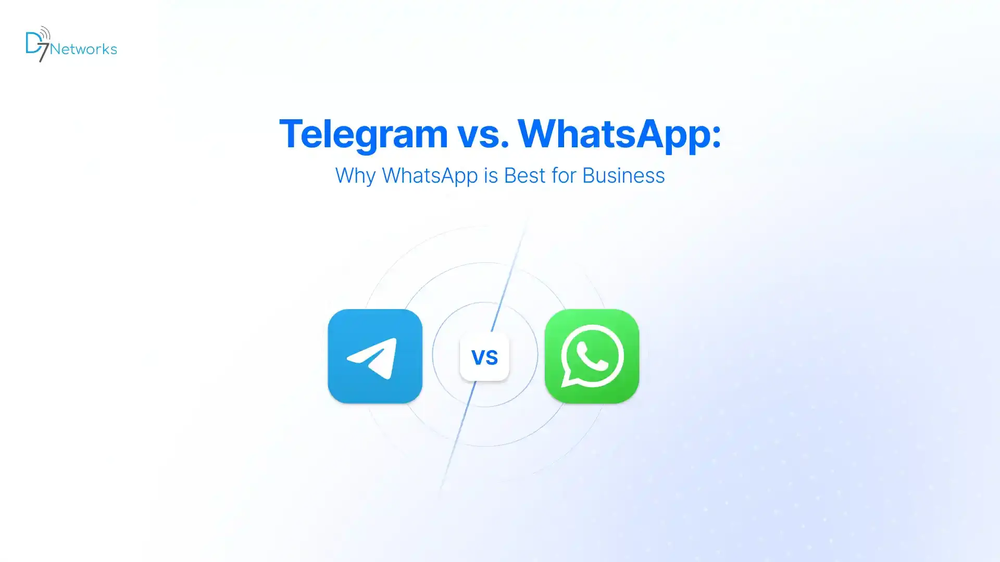
Telegram vs. WhatsApp: Why WhatsApp is Best for Business
Learn why WhatsApp is the Best choice for business, offering superior features and better customer engagement when compared to Telegram.
In the digital age, instant messaging has been a staple of our professional and personal lives. Of all the options available, WhatsApp and Telegram stand out as two of the most popular platforms. Though both offer a wide variety of communication options, WhatsApp has emerged as the most popular business option. This article will explore the specifics and features of each, analyze the capabilities of each, and then discuss the advantages of each platform and why WhatsApp is the preferred option for business communication.
What is WhatsApp?
WhatsApp is a free messaging, calling, and Voice-Over-IP (VoIP) service owned by the technology conglomerate Meta. First launched in 2009, it has grown to become one of the most popular messaging apps in the world, with over 2 billion monthly active users by 2024.
WhatsApp allows users to send messages using text or audio, make video and voice calls, and share images, documents, location-specific information, and other kinds of media. It is known for its encryption capabilities from beginning to end, which ensures that only the user sending and receiving messages will be able to see them.
While the original design was geared towards individuals, WhatsApp has evolved to accommodate the requirements of business users through the introduction of WhatsApp Business and WhatsApp Business API. These versions for businesses include features specifically designed for customer support and communications.
Unlock the potential of WhatsApp for your business. Contact D7 Networks to learn how our WhatsApp Business API can streamline your customer communication!
What is Telegram?
Telegram is an online instant messaging service that was introduced in 2013. It offers features like WhatsApp, including voice and text messaging, videos, file sharing, and group chat rooms. Telegram is well-known for its focus on security and speed, and messages are stored across all users' devices.
One of Telegram's distinctive features is its ability to support large-scale chat rooms and channels with up to 200,000 members. Telegram also offers a flexible platform for designers to create bots and modify features.
While Telegram has enjoyed increased popularity among certain user groups, such as those with a concern for privacy and those looking for an option for mass-scale communication, it has achieved an entirely different level of acceptance in comparison to WhatsApp and WhatsApp specifically in the business world.
What's the difference between WhatsApp and Telegram?
While WhatsApp and Telegram have many similarities with their messaging platforms, they do have some fundamental distinct features that set them apart.
- Customers: WhatsApp has a larger user base, boasting over 2 billion active users per month, while Telegram has 700 million active daily users. This implies Encryption is recognized as a more popular app. WhatsApp is more widely used and more likely to be downloaded on users' devices.
- Safety: WhatsApp offers end-to-end Encryption as a standard feature in all chats. Telegram, however, provides Encryption only within the "Secret Chats" feature, and regular chats rely on server-client Encryption.
- Sharing Files: Telegram permits users to transfer files larger than 2GB. WhatsApp can only be used for 100MB for documents and 16 Megabytes for media files
- Group size: Telegram allows for larger groups with up to 200k members, while WhatsApp groups can only hold a capacity of 1024 people.
- Channels: Telegram has channels. Telegram's "Channels" feature allows broadcasting messages to a wide audience, which WhatsApp doesn't offer.
- Cloud Storage: Telegram saves all of its messages and other media on the cloud and gives access to different devices. WhatsApp doesn't store messages on devices or as backups.
- Business Features WhatsApp provides specific features for business users that are available via WhatsApp Business and WhatsApp Business API and were designed to help customers communicate with each other and provide assistance. Telegram is not equipped with these features specifically for businesses.
- Bots and Customization: Telegram offers an extensive range of support for bots as well as third-party development that lets you be more flexible in the customization process. Bots that are not available on WhatsApp are restricted.
- Desktop Experience: Telegram has a full desktop application that can be used separately from the mobile. WhatsApp's desktop application requires your phone to have internet access.
- Security: Telegram allows users to conceal their numbers from groups as well as channels, which provides greater protection. WhatsApp also requires users to share their phone numbers.
These distinctions are important in determining the right platform for various situations, especially in the context of business.
Features Comparison: WhatsApp vs Telegram
WhatsApp features
- End-to-end encryption: All messages, calls, and other files uploaded to WhatsApp are protected by end-to-end encryption, which is a standard feature that provides security and protection in all chats.
- WhatsApp Business Application: A free application created explicitly for small-sized businesses that include features like business profile pages, fast replies, labeling and labeling, quick replies, and automatic messages.
- WhatsApp Business API: Is a paid service for medium-sized and large companies that enables integration with CRM software, multiple users, and automation capabilities.
- Verified business profiles: Verification of green checkmarks for companies, increasing the confidence and trust of customers.
- Catalogs for businesses: The catalogs can show their products and services right within the app, making it much easier for clients to view and request information about their items and services.
- Click-to-WhatsApp Advertisements: This feature is integrated with Facebook and Instagram advertisements and allows companies to start WhatsApp conversations directly from advertisements by clicking.
- WhatsApp Pay: A payment option in the app (available in a limited range of international countries) to enable seamless transactions between companies and customers.
- Broadcast lists: The capability to send messages to a variety of individuals at once without the need to set up an online chat group.
- Status updates: Businesses can temporarily publish announcements or updates. Updates, promotions, or news announcements are accessible to their customers throughout the day.
- Audio and Video Calls: HD videos and voice calls are available for group and one-on-one conversations.
- Application for Web and Desktop: Use WhatsApp from computers and sync it to the mobile app to ensure seamless communication across desktop and mobile devices.
- QR code: Businesses can create QR codes that customers can scan to start conversations quickly.
- Message templates: Approved message templates that companies can utilize to send announcements and important updates to customers who have opted for them.
- Analytics: Business account analytics monitors the metrics of messages and customer engagement.
- Multi-Device Support: The capability to use WhatsApp on up to 4 smartphones at once if your primary phone is not online.
Telegram Features
- Cloud-Based Messaging: All files and messages are stored in the cloud and accessible from all devices.
- Large Group Chats: Assistance is provided for groups with up to 200k members.
- Channels: Feature one-way broadcasting for large-scale viewers.
- Secret Chats: End-to-end encryption of chats, which self-destruct messages.
- Bots: Full support for chatbots and automation through Telegram Bot API. Telegram Bot API.
- File Sharing: The capability to share files between two gigabytes and larger by size.
- Customization: Users can design their designs or even create stickers.
- Edit messages: The ability to modify messages that were delivered within a specific time.
- Username System: Usernames can identify the users without sharing phone numbers.
- Questions and surveys: Inbuilt functions to create surveys and quizzes within chatrooms and channels.
- Vocal Chats: A chat group that lets you host many thousands of participants.
- Self-Destructing Messages: You are able to make messages self-destruct after an exact time.
- Telegram Passport: Secure storage as well as sharing and distribution of your identity documentation.
- Animation Stickers: Support for animated sticker packs.
- Instant View: Is a feature that allows you to look up web pages instantly on Telegram.
Why WhatsApp is Best for Business
Although both applications, WhatsApp and Telegram, offer strong communication capabilities, WhatsApp has emerged as the most popular choice for business for a range of reasons.
- Larger User Base: With a more significant number of two billion users each year, WhatsApp provides businesses with the potential for a more extensive client base. Most users use WhatsApp to access their phones and do not require the download of a new app to connect with businesses.
- Business-Specific Features: WhatsApp has developed dedicated tools specifically for businesses, including WhatsApp Business and WhatsApp Business API, which were specifically designed to meet the needs of businesses. These tools include features such as profiles for businesses' profiles and automatic replies, with integration with CRM systems. (CRM) software.
- Verified business accounts: Green checkmark that indicates verification for business accounts on WhatsApp improves credibility and assists users in distinguishing legitimate businesses from fakes or frauds.
- End-to-end encryption: By default in WhatsApp's end-to-end encryption for all messages provides an enhanced level of security and protection. This is vital for companies that handle sensitive customer data.
- Integration with Facebook Ecosystem: As an integral component of the Meta (formerly Facebook) family of applications, WhatsApp offers seamless integration with Facebook and Instagram to facilitate marketing and customer interaction.
- Familiarity and User Comfort: Due to its wide usage, the majority of users are accustomed to WhatsApp's interface and features. WhatsApp's interface and capabilities make it simple for them to connect with businesses on WhatsApp.
- WhatsApp Pay: Application is available in all accessible areas. The WhatsApp Pay platform allows seamless transactions inside the app, making it simpler for companies to handle payments directly using this messaging app.
- Catalog Feature: WhatsApp allows companies to display their offerings to customers by enabling them to showcase their products and services directly.
- Message Templates: Templates approved for messages permit businesses to provide timely notifications and updates to customers while complying with regulations regarding messaging.
- Click-to-WhatsApp advertisements: This feature lets businesses initiate WhatsApp conversations directly via Facebook and Instagram ads, resulting in a unidirectional route from advertisement to customer interaction.
- Multi-device Support: The ability to use WhatsApp on multiple platforms simultaneously helps companies better manage customer communications with different team members and devices.
- Group Chat Limitations: While Telegram permits more extensive group chats than WhatsApp, its restrictions on the number of groups (1024 members) could be advantageous for companies since it will allow for more targeted and controlled interactions with customers.
- Broadcast Lists: This feature lets businesses send messages to a variety of customers at once without setting up an online chat room while creating separate chat threads for each client.
- Status Updates: Companies can use WhatsApp Status to publish short updates, promotions, or announcements, providing another method of customer interaction and marketing.
- QR codes: You can quickly create QR codes that allow customers to start conversations rapidly and improve the experience for customers, whether physically in physical locations or through printing materials.
- Videos and voice calls: Voice and video calling with high-quality capabilities allow businesses to provide personalized customer service as well as conduct virtual meetings with their customers.
- Analytics: Although WhatsApp offers fundamental analytics, the Business account enables organizations to keep track of metrics related to messages, customer interaction, and data-driven decisions.
- Compliance and Regulations: WhatsApp's business features were designed to help ensure compliance, assist companies in complying with messaging rules, and protect customers' privacy.
- Customer Preference: Many customers prefer to communicate with businesses through WhatsApp due to its simplicity and ease of use, which could lead to a higher rate of interaction.
- Global Reach: WhatsApp's impact in various countries around the globe makes it a great option for companies that want to expand internationally or connect with clients worldwide.
Together, these components create WhatsApp, one of the most efficient and adaptable platforms for businesses looking to improve their customer service and communications strategies. Although Telegram has its benefits, it's not without merits, particularly in the field of large-scale groups, as well as customizing bots; its emphasis on features for business and its broad application makes it the most popular choice for the majority of business applications.
D7 Networks provides WhatsApp API.
If you're a business trying to leverage WhatsApp's efficiency to improve your customer communication strategies, D7 Networks offers a reliable solution through its WhatsApp API services. D7 Networks is a leading provider of communication APIs, including WhatsApp Business API, which assists businesses in improving their customer interactions and increasing engagement.
The primary benefits of using D7 Networks for WhatsApp API integration are:
- Simple Integration: D7 Networks provides simple and straightforward integration of an API for WhatsApp. WhatsApp Business API into existing business workflows and systems.
- Scalability: The system was created to handle huge amounts of data, making it suitable for businesses of all sizes.
- Automatic Capabilities: D7 Networks' WhatsApp API allows businesses to automatize their responses, create chatbots, and create efficient workflows that help customers and improve engagement.
- Multi-Agent Service: It enables more than one team member to utilize and keep track of WhatsApp messages, which enhances the speed of service and effectiveness of customer support.
- Analysis and reporting: Advanced analytics tools help businesses monitor message delivery along with open and read rates and also the metrics of customer satisfaction.
- Security and Compliance: D7 Networks ensures that its WhatsApp API solution complies with WhatsApp's guidelines and adheres to the highest standards for data security.
- Personalization for businesses: They can modify the WhatsApp interface to match their brand's tone and their customers' communication needs.
- Technical Support: D7 Networks offers dedicated technical support to businesses designing and enhancing the functionality of WhatsApp Business API integration.
- Cost-effective: By utilizing D7 Networks' infrastructure, companies can take advantage of WhatsApp Business API without a significant initial investment in technology or other resources.
- Global Reach: D7 Networks is suitable for sending international messages and letting businesses reach their customers around the world through WhatsApp.
Experience the power of WhatsApp Business API risk-free! Start your free trialand see the difference it can make for your business.
Through a partnership with D7 Networks for WhatsApp API integration, companies can unlock WhatsApp's potential as a communications channel. This allows them to provide an easy, personal, and effective customer experience that ultimately results in increased customer satisfaction and business growth.
While both WhatsApp and Telegram offer helpful features for digital communication, WhatsApp's more precise functions, a more significant number of users, and extensive security features are the most effective options for businesses. Utilizing WhatsApp's capabilities, mainly via applications like D7 Networks' WhatsApp API, will allow businesses to enhance their customer engagement strategies, increase communication, and ultimately, grow in the new digital world of business.
Frequently Asked Questions ( FAQs)
What is the main difference between WhatsApp and Telegram for business use?
WhatsApp is focused primarily on business and personal communication with specific features specifically designed for businesses including WhatsApp Business and WhatsApp Business API. Telegram is a messaging app that offers certain business functions but is primarily geared towards large-scale messaging and group communication.
Can businesses use WhatsApp for customer support?
yes, WhatsApp can be used to offer customer service. Businesses can benefit from WhatsApp Business functions, which include automatic responses, rapid responses, and template messages to increase customer service.
Can I send promotional messages via WhatsApp?
Businesses can send messages for promotion via WhatsApp using approved messaging templates. It is essential to ensure that messages conform to WhatsApp's guidelines and promotional content.
Is Telegram Safer Than WhatsApp?
No, WhatsApp is generally considered more secure than Telegram for private conversations. WhatsApp provides encryption from beginning to end for every chat, meaning that only the sender and receiver are able to access chat messages. The difference is that Telegram has encryption that is complete within "Secret Chats," while regular chats depend on encryption via the server. This allows Telegram to gain access to messages.
Telegram or WhatsApp: Which App Has More Security?
WhatsApp has a higher degree of security due to its default encryption at the end of all messages and calls. Telegram provides a number of distinct privacy features, and it relies on server-client encryption to secure chats, making it less secure in general.



